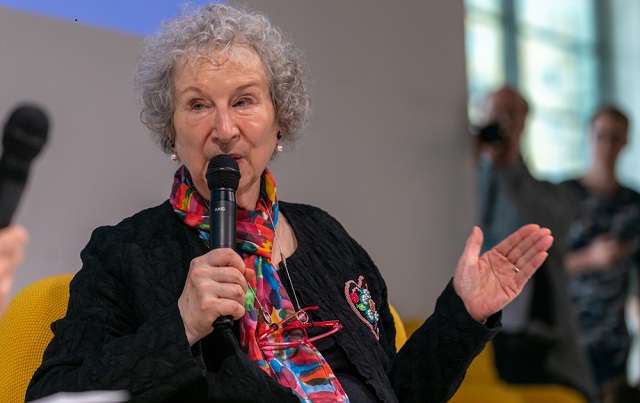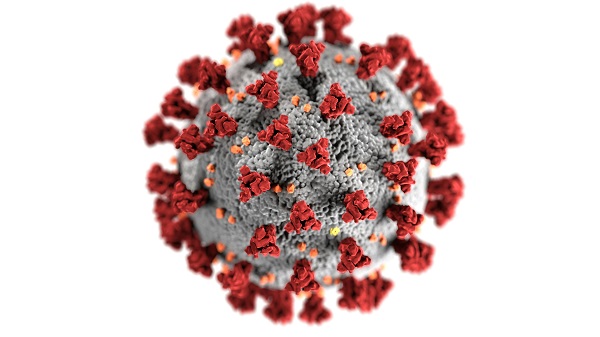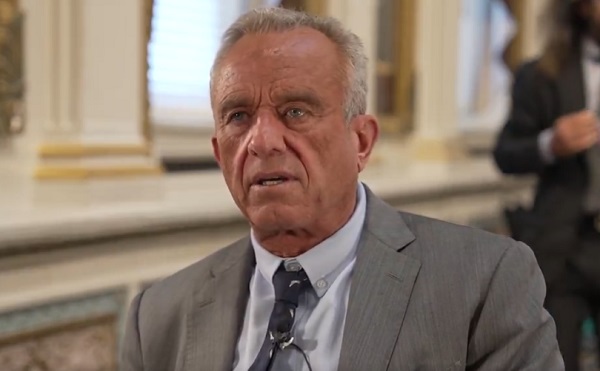Censorship Industrial Complex
Margaret Atwood compares Trudeau’s proposed Online Harms Act to Orwell’s ‘1984’

From LifeSiteNews
According to the proposed legislation, the bill would not only punish those who committed a “hate crime” but also those suspected of committing one in the future.
Liberal Attorney General and Justice Minister Arif Virani defended the Online Harms bill after Canadian author Margaret Atwood compared it to George Orwell’s dystopian novel Nineteen Eighty-Four.
On March 12, Virani claimed Atwood, famous for writing The Handmaid’s Tale, misunderstood the Online Harms Act, after the left-leaning author warned it would punish Canadians for “thoughtcrime,” comparing the legislation to laws introduced by totalitarian regimes such as the corrupt French aristocracy and the Soviet Union.
“If this account of the bill is true, it’s Lettres de Cachet all over again,” Atwood wrote on X, formerly known as Twitter, referring to secret letters sent by the King of France authorizing citizens to be imprisoned without a trial.
“The possibilities for revenge false accusations + thoughtcrime stuff are sooo inviting!” she added sarcastically. “Trudeau’s Orwellian online harms bill.”
If this account of the bill is true, it’s Lettres de Cachet all over again. The possibilities for revenge false accusations + thoughtcrime stuff are sooo inviting! Trudeau’s Orwellian online harms bill https://t.co/GziivgfNGt
— Margaret E Atwood (@MargaretAtwood) March 9, 2024
Atwood’s comment came in response to an article by The Spectator which warned the bill could lead to “thought police” regulating Canadians similar to those in George Orwell’s dystopian novel Nineteen Eighty-Four.
The often-referenced book is a cautionary novel about a totalitarian socialist society which punished its citizens if they disagreed their government’s agenda even in their thoughts.
While Atwood is known to be left-leaning, this is not the first time she called out Prime Minister Justin Trudeau for restricting freedom of speech. In April 2023, Atwood cautioned against Trudeau’s internet censorship legislation Bill C-11, comparing it to censorship in the Soviet Union.
Following Atwood’s comments online, Virani quickly attempted to reassure Canadians that she had just misunderstood the legislation, explaining that the bill’s definition of “hate speech” does not include what is “awful but lawful.”
“It includes expressions of detestation and vilification. It does not include insults, offensive comments, or jokes that are not very polite,” said Virani at a press conference in Toronto.
“The idea that someone on their smartphone on an afternoon while they’re watching a football game, if they insult anyone … could be condemned in a court or caught by a peace bond is ridiculous, in my opinion,” he added.
However, Virani conveniently neglected to say what would be considered “hate speech,” especially considering the bill regulates “posting hate speech online” that is deemed “discriminatory” against a wide range of “protected” categories, notably gender, race and sexuality.
Bill C-63, introduced last week, will create the Online Harms Act and modify existing laws, amending the Criminal Code as well as the Canadian Human Rights Act, in what the Liberals claim will target certain cases of internet content removal, notably those involving child sexual abuse and pornography.
However, the bill also seeks to punish “hate speech” and increase punishments for existing hate propaganda offenses in a substantial manner.
Penalties for violations of the proposed law include $20,000 fines and jail time, including life in prison for what it deems the most serious offenses.
According to the proposed legislation, the bill would not only punish those who committed a “hate crime” but also those suspected of committing one in the future.
“A person may, with the Attorney General’s consent, lay an information before a provincial court judge if the person fears on reasonable grounds that another person will commit; (a)an offence under section 318 or any of subsections 319(1) to (2.1); or (b) an offence under section 320.1001,” the text of the bill reads.
Atwood is not alone in her concerns over the legislation. Increasingly, prominent Canadians and even Americans have begun commenting on Trudeau’s authoritarian rule over Canada, particularly his restricting of internet speech.
Earlier this week, tech mogul Elon Musk called the proposed legislation “insane” as the new law would “allow judges to hand down life sentences for ‘speech crimes.’”
In late February, prominent Canadian anti-woke psychologist Jordan Peterson warned the new bill would undoubtedly lead to his criminalization.
Similarly, a top constitutional lawyer warned LifeSiteNews that the legislation will allow a yet-to-be-formed digital safety commission to conduct “secret commission hearings” against those found to have violated the law, raising “serious concerns for the freedom of expression” of Canadians online.
Additionally, Campaign Life Coalition recently warned that Bill C-63 will stifle free speech and crush pro-life activism.
Censorship Industrial Complex
Welcome to Britain, Where Critical WhatsApp Messages Are a Police Matter

By
“It was just unfathomable to me that things had escalated to this degree,”
“We’d never used abusive or threatening language, even in private.”
|
You’d think that in Britain, the worst thing that could happen to you after sending a few critical WhatsApp messages would be a passive-aggressive reply or, at most, a snooty whisper campaign. What you probably wouldn’t expect is to have six police officers show up on your doorstep like they’re hunting down a cartel. But that’s precisely what happened to Maxie Allen and Rosalind Levine — two parents whose great offense was asking some mildly inconvenient questions about how their daughter’s school planned to replace its retiring principal.
This is not an episode of Black Mirror. This is Borehamwood, Hertfordshire, 2025. And the parents in question—Maxie Allen, a Times Radio producer, and Rosalind Levine, 46, a mother of two—had the gall to inquire, via WhatsApp no less, whether Cowley Hill Primary School was being entirely above board in appointing a new principal.
What happened next should make everyone in Britain pause and consider just how overreaching their government has become. Because in the time it takes to send a meme about the school’s bake sale, you too could be staring down the barrel of a “malicious communications” charge.
The trouble started in May, shortly after the school’s principal retired. Instead of the usual round of polite emails, clumsy PowerPoints, and dreary Q&A sessions, there was… silence. Maxie Allen, who had once served as a school governor—so presumably knows his way around a budget meeting—asked the unthinkable: when was the recruitment process going to be opened up?
A fair question, right? Not in Borehamwood, apparently. The school responded not with answers, but with a sort of preemptive nuclear strike.
Jackie Spriggs, the chair of governors, issued a public warning about “inflammatory and defamatory” social media posts and hinted at disciplinary action for those who dared to cause “disharmony.” One imagines this word being uttered in the tone of a Bond villain stroking a white cat.
|
 |
Parents Allen and Levine were questioned by police over their WhatsApp messages. |
|
For the crime of “casting aspersions,” Allen and Levine were promptly banned from the school premises. That meant no parents’ evening, no Christmas concert, no chance to speak face-to-face about the specific needs of their daughter Sascha, who—just to add to the bleakness of it all—has epilepsy and is registered disabled.
So what do you do when the school shuts its doors in your face? You send emails. Lots of them. You try to get answers. And if that fails, you might—just might—vent a little on WhatsApp.
But apparently, that was enough to earn the label of harassers. Not in the figurative, overly sensitive, “Karen’s upset again” sense. No, this was the actual, legal, possibly-prison kind of harassment.
Then came January 29. Rosalind was at home sorting toys for charity—presumably a heinous act in today’s climate—when she opened the door to what can only be described as a low-budget reboot of Line of Duty. Six officers. Two cars. A van. All to arrest two middle-aged parents whose biggest vice appears to be stubborn curiosity.
“I saw six police officers standing there,” she said. “My first thought was that Sascha was dead.”
Instead, it was the prelude to an 11-hour ordeal in a police cell. Eleven hours. That’s enough time to commit actual crimes, be tried, be sentenced, and still get home in time for MasterChef.
Allen called the experience “dystopian,” and, for once, the word isn’t hyperbole. “It was just unfathomable to me that things had escalated to this degree,” he said. “We’d never used abusive or threatening language, even in private.”
Worse still, they were never even told which communications were being investigated. It’s like being detained by police for “vibes.”
One of the many delightful ironies here is that the school accused them of causing a “nuisance on school property,” despite the fact that neither of them had set foot on said property in six months.
Now, in the school’s defense—such as it is—they claim they went to the police because the sheer volume of correspondence and social media posts had become “upsetting.” Which raises an important question: when did being “upsetting” become a police matter?
What we’re witnessing is not a breakdown in communication, but a full-blown bureaucratic tantrum. Instead of engaging with concerned parents, Cowley Hill’s leadership took the nuclear option: drag them out in cuffs and let the police deal with it.
Hertfordshire Constabulary, apparently mistaking Borehamwood for Basra, decided this was a perfectly normal use of resources. “The number of officers was necessary,” said a spokesman, “to secure electronic devices and care for children at the address.”
Right. Nothing says “childcare” like watching your mom get led away in handcuffs while your toddler hides in the corner, traumatized.
After five weeks—five weeks of real police time, in a country where burglaries are basically a form of inheritance transfer—the whole thing was quietly dropped. Insufficient evidence. No charges. Not even a slap on the wrist.
So here we are. A story about a couple who dared to question how a public school was run, and ended up locked in a cell, banned from the school play, and smeared with criminal accusations for trying to advocate for their disabled child.
This is Britain in 2025. A place where public institutions behave like paranoid cults and the police are deployed like private security firms for anyone with a bruised ego. All while the rest of the population is left wondering how many other WhatsApp groups are one message away from a dawn raid.
Because if this is what happens when you ask a few inconvenient questions, what’s next? Fingerprinting people for liking the wrong Facebook post? Tactical units sent in for sarcastic TripAdvisor reviews?
It’s a warning. Ask the wrong question, speak out of turn, and you too may get a visit from half the local police force.
|
|
|
|
Reclaim The Net values your free speech and privacy. Each issue we publish is a commitment to defend these critical rights, providing insights and actionable information to protect and promote liberty in the digital age.
Despite our wide readership, less than 0.2% of our readers contribute financially. With your support, we can do more than just continue; we can amplify voices that are often suppressed and spread the word about the urgent issues of censorship and surveillance. Consider making a modest donation — just $5, or whatever amount you can afford. Your contribution will empower us to reach more people, educate them about these pressing issues, and engage them in our collective cause. Thank you for considering a contribution. Each donation not only supports our operations but also strengthens our efforts to challenge injustices and advocate for those who cannot speak out. Thank you.
|
Censorship Industrial Complex
They knew it was a lab leak all along

 MxM News
MxM News
Newly Revealed Documents Confirm Lab Leak Coverup
Quick Hit:
The global debate over COVID-19’s origins has taken a dramatic turn after newly uncovered reports indicate that intelligence agencies in Germany had determined with near certainty that the virus originated in a Chinese lab as early as 2020. Despite this revelation, German Chancellor Angela Merkel reportedly chose to suppress the findings, aligning with a broader pattern of obfuscation by Western governments and media outlets.
Key Details:
-
German newspapers Zeit and Süddeutsche Zeitung reported that Germany’s intelligence agency, the BND, concluded in early 2020 with 80% to 95% certainty that COVID-19 leaked from a lab in Wuhan, China.
-
The intelligence was based on a combination of public-domain research and classified investigations under the code name “Saaremaa.”
-
Merkel’s administration allegedly buried the findings, with her successor Olaf Scholz continuing the suppression, ensuring the information remained hidden from the public until now.
Diving Deeper:
Journalist Alex Berenson detailed the shocking revelations in his Substack op-ed, underscoring how “the American media is doing its best to ignore the biggest news this week.” Berenson criticized legacy media outlets for fixating on the five-year anniversary of COVID-19 while sidestepping the implications of newly surfaced intelligence.
According to Berenson, German intelligence reached its high-confidence conclusion after analyzing public materials and conducting covert operations. “The material… indicated that there had been some risky research methods used there [at the Wuhan Institute of Virology], compounded by breaches of laboratory safety rules… [and] so-called gain-of-function experiments, in which viruses occurring in nature are manipulated [to become more dangerous or transmissible],” he wrote.
Rather than alert the world to the evidence, Merkel chose to suppress it. Berenson sarcastically noted, “Who immediately told the world of the findings and demanded a full investigation into what China’s totalitarian government knew and when it knew it? Nah, I’m funning you. Angela stuffed that report in a drawer and got back to doing what she did best, destroying Germany’s industrial base to make Greta Thunberg happy.”
The refusal to disclose this intelligence aligns with a broader pattern of deception from both governmental and media institutions, which spent years dismissing the lab leak hypothesis as a conspiracy theory. Berenson noted that during early 2020, “Dr. Anthony S. Fauci and Peter Daszak… were gently steering their fellow scientists towards a conclusion that COVID’s origins were 100 billion zillion percent natural.”
Even after Merkel left office in 2021, Scholz’s government continued to keep the intelligence under wraps. “The BND told her replacement, Olaf Scholz, ‘without the results finding their way to the public’ — as the British newspaper The Telegraph delicately put it,” Berenson wrote. Now that the findings have emerged, the German government has not denied the reports, leaving Berenson to conclude, “There’s about a 100 to 100 percent chance they’re true.”
The final takeaway? “We all sorta knew this already, right? Both the lab leak and the coverup,” Berenson observed. “But there’s knowing and there’s knowing. And it looks like the same American news outlets that spent 2020 and 2021 lying (or, at best, being hopelessly credulous) about China and COVID still aren’t ready to come clean.”
As new evidence continues to surface, the question remains: Will legacy media and world leaders finally acknowledge the lab leak theory as fact, or will they continue to deflect responsibility and protect their preferred narratives?
-

 Uncategorized10 hours ago
Uncategorized10 hours agoPoilievre on 2025 Election Interference – Carney sill hasn’t fired Liberal MP in Chinese election interference scandal
-

 Business20 hours ago
Business20 hours agoCuba has lost 24% of it’s population to emigration in the last 4 years
-

 Business2 days ago
Business2 days agoLabor Department cancels “America Last” spending spree spanning five continents
-

 2025 Federal Election2 days ago
2025 Federal Election2 days agoCanadian Banks Tied to Chinese Fentanyl Laundering Risk U.S. Treasury Sanctions After Cartel Terror Designation
-

 Health2 days ago
Health2 days agoRFK Jr. says ‘everything is going to change’ with CDC vaccine policy in Michael Knowles interview
-

 Automotive2 days ago
Automotive2 days agoTrump warns U.S. automakers: Do not raise prices in response to tariffs
-

 2025 Federal Election2 days ago
2025 Federal Election2 days agoNext federal government should recognize Alberta’s important role in the federation
-

 Business1 day ago
Business1 day agoTariff-driven increase of U.S. manufacturing investment would face dearth of workers







